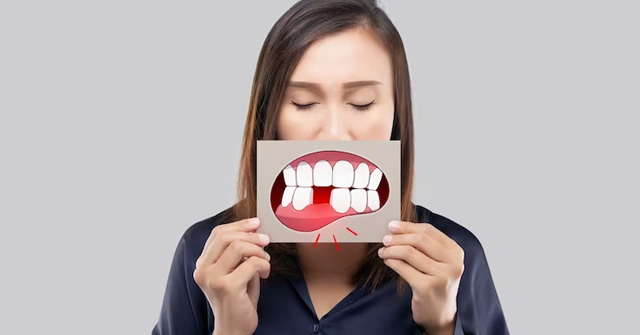Accidents occur when we least expect them, and a knocked-out tooth is one such distressing occurrence. Reacting quickly and effectively can protect your teeth and overall dental health in emergency dentistry cases, whether due to a fall, a sports injury, or any other unforeseen accident. Carstairs Dental blog will lead you through the important actions to follow if a tooth is unintentionally knocked out. You can improve your chances of successful tooth restoration and lessen any long-term effects by staying educated and taking quick action.
Immediate Steps
It is important to remain composed and take action when managing a knocked-out tooth. Handle the tooth by the crown rather than the base to prevent harming fragile cells. Try to return the tooth to the socket. If not, gently rinse the tooth with water, avoid rubbing or removing tissue fragments. Place the tooth in a suitable storage option if reinsertion is not possible. For a successful reattachment, you must act quickly and seek general dentistry professional dental care within 30 minutes. A glass of milk, saline solution, saliva, and a tooth protection kit are typical storage options. To save the tooth and ensure effective treatment, seeking immediate dental care, preferably with a dentist office nearby, is necessary.
Emergency Dental Care
To successfully reattach or restore a knocked-out tooth during emergency dentistry, take the following actions:
- Immediately make contact with an emergency dentist. Look for dental practices that offer after-hours or 24/7 emergency treatments. Seek help from Carstairs dentist immediately for a dislodged tooth; timing is crucial for proper care.
- Describe the case fully, including the circumstances, whether the tooth is permanent or a baby, and any prior treatment. The dentist will evaluate the circumstance and offer you appropriate advice.
- Comply with the emergency dentist’s recommendations for immediate care, including controlling bleeding, keeping the tooth in place, and relieving pain.
- Explore whether a same-day appointment is possible. Numerous dental facilities prioritize emergencies and will fit you in immediately.
Keep your composure and attention on the task because emergency dentists are prepared to manage such situations. The prospects of a successful restoration are strongly impacted by the actions done as soon as a tooth is knocked out.
Tooth Preservation Techniques
Keep a knocked-out tooth moist and active by storing it in milk or saliva. If reinsertion is impossible, put the tooth in a tiny cup or container containing milk or saliva. To improve the likelihood of a successful reattachment, use a tooth protection kit available at pharmacies.
Water can harm the tooth’s root surface and lessen the likelihood of reattachment. Therefore avoid keeping the tooth in water or allowing it to dry out. To stop drying, cover the tooth in paper or fabric. The objective is to keep the tooth healthy until it gets professional attention. After putting the tooth in a suitable container, get prompt dental care.
Do’s and Don’ts
Act promptly, manage the crown, rinse carefully, reinsert if possible, preserve the tooth correctly, seek professional assistance, and refrain from touching the root while handling a knocked-out tooth. Avoid using alcohol or disinfectants, wrapping the teeth in tissue, or delaying obtaining assistance.
These steps can ensure the tooth’s long-term health and greatly impact the outcome. To increase the possibilities of keeping the tooth and assuring its long-term health, keep your cool, handle the tooth appropriately, and seek quick, professional dental care during emergency dentistry.
Prevention Tips
When playing sports, secure your teeth from impact by wearing a mouthguard to avoid dental emergencies. To protect the integrity of your teeth and prevent unnecessary harm, refrain from chewing on brittle things or ice. Regularly flossing, brushing, avoiding acidic and sweet foods, and seeing the dentist office nearby can keep your mouth healthy.
Avoid using your teeth as a tool, restrict foods high in sugar and acid, and visit the dentist regularly to catch possible problems before they become crises. By caring for dental problems, you can stop them from worsening and possibly developing into emergencies. You may dramatically lower the chance of a dental emergency by implementing the prevention advice in this blog and keeping proper oral hygiene habits. You can also benefit from a healthier smile.
Conclusion
Maintaining composure and taking rapid action in dental crises, especially if a tooth is knocked out, can help to preserve your smile during emergency dentistry. Keep in mind that quick action is important. Every second counts from the first steps of appropriately handling the tooth, gently cleaning, and considering reinsertion to getting professional guidance and using appropriate tooth preservation techniques. Your dental health is a priceless asset, and with the knowledge you receive from this manual, you will be better prepared to deal with unforeseen circumstances and protect your smile for years to come.
When a tooth takes an unplanned break, reach out to the Denture Clinic Carstairs – your dependable dental partner. We alleviate concerns and bring back smiles. Drop by or call anytime; we’re here for all appointments and worries, big or small.
Our greatest goal is your dental health. We are here to ensure your smile is as radiant as ever. Trust Carstairs Dental Clinic, No matter the time, let us keep your smile in good condition.


